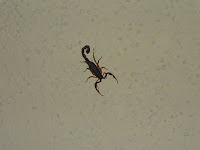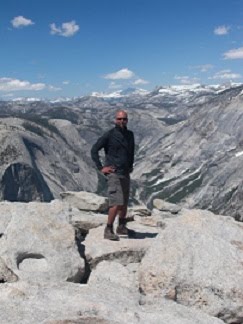As the sun sets on my time in Guatemala, I look back on my five weeks on the banks of Lago Atitlan with a great deal of fondness. San Pedro La Laguna is the first place I have stayed for more than a small handful of days during my three months of travelling, and this combined with staying with a local Guatamalteco family allowed a fascinating insight into rural Central American life that I would not have been otherwise afforded.
It is amazing how quickly an extranjero adapts to a different culture and way of life, and also how that life and culture has grown accustomed to having outsiders. Not once during my month in San Pedro did I hear a 'mirale extranjero' as I walked through the town, such have the locals grown used to having foreigners in their midst. Instead, I soon became accustomed to being bid a ´buenas dias´ with
a warm smile, and in the case of one particular old man, a firm shaking of my hand as well.
San Pedro and the other pueblos around Lago Atitlan rely heavily on tourism, and it is clear that many of the villages would be significantly impacted if the foreign visitors were to suddenly stop. However despite this reliance, thet were an extremely proud people. Not once did someone stop me in the street to ask me for money, something that has happened at least once in every other place I have visited during my travels through the Americas thus far. Which is not of course to say that many of the locals in San Pedro were not extremely poor. Many houses did not have glass in the windows, some were made of bamboo, and almost all had roofs of corrugated iron. Many women wash the household dirty laundry in Lago Atitlan, and some of the poorer families did their personal bathing in the lake as well. It was rare in San Pedro that I paid for something in a shop with a 100
Queznales note (approximately GBP 8) and the shopkeeper did not have to
leave the counter to go off in search of change.
It was the seventh birthday of Juan, one of the boys at my homestay whilst I was there, and although I am not sure if he received any presents, I have never seen a boy smile so happily as he did when he was served a hamburger, chips and glass of coke for his special lunch. Similarly, the sincere gratitude of Augustin, the oldest of the homestay brothers when I gave him my broken fishing rod and tackle box as a regalo, was immediately obvious to see. I hope him and his brothers have more success catching pescado on Lago Atitlan with the rod than I had on the banks of Lake Tahoe.
Despite the poverty faced by many people in San Pedro, the honesty of the Guatamalteco's in the town was something to be appreciated. One day I went into five shops in search of a razor with replaceable blades. The first four shops only sold disposable razors, but each shopkeeper generously redirected me to the next shop along the street so I could see if their competitor perhaps had what I wanted. Would this have happened in the UK or the other countries I have visited so far in my travels, or would the shopkeeper have sold me a line about what I wanted not being sold anywhere and given me a hard sell on what they themselves had in stock? I think I already know the answer to that.
Another day, a shopkeeper came from behind his counter to highlight a different brand of toilet roll that would cost me half the price of the one I had already picked up off the shelf. Perhaps it wasnt't four ply quilted, but it was small gestures like that, that made me really like the locals in San Pedro.
Living with Rosa and Felipe and their children in my San Pedro homestay taught me that in many ways, Guatamalteco life really is no different to other countries such as the UK. Women watch soap operas and stand in the streets gossipping
(but invariably with a cloth bag of freshly baked tortillas on their head),
and the men watch as much football as they can on the telly and talk about it afterwards in the street (but
invariably with a machete tucked in their belt). Teenage boys turn their heads to look at young women from a different angle after they have walked past them on the street. Teenage girls giggle and play with their hair when young men walk past them in the street. Young children watch Los Simpsons, play noughts and crosses and eat food that has fallen on the floor.
Apparently there are several young children in the towns around Lago Atitlan with first names like Laura (Pausini) and Enrique (Iglesias), which of course reminded me of all the Britneys and Justins we have in Britain. It was my Spanish maestra Clarita that told me this, along with numerous other amusing and/or serious insights into life in Guatemala. Clarita was definitely 'el paquete completo' when it came to making learning Spanish fun, I will certainly miss her hilarious stories about her lewd grandmother, her cross-dressing neighbour, the American tourist who tried to woo a woman with a goat and of course, the fat girl in a neighbouring town that got jealous when a gang sexually assaulted her two friends on a bus, but not her.
And of course I will miss the hospitality of my homestay family: Felipe, Rosa and their children. I will miss Felipe´s kindness, inviting me to have lunch with the family on the Sunday of the World Cup final. I
will miss Rosa's cooking, the chuchitos, tamales, frijoles, caldo
de pollo, dobladas and hilachas, and of course, the fresh warm tortillas that
came with almost every meal. I will miss the evening games of football with my homestay brothers, Escocia contra Guatemala. I may even miss the family dog Scooby waking me up with his barking at four o'clock in the morning, but probably not so much.
I am genuinely sorry to be moving on from San Pedro, and leave with a heavy rucksack on my back for the first time in a while, and an extremely heavy heart. If it
wasn't for many more Central American countries and the whole of
South America still to come, I could easily have enjoyed the tranquilo life by Lago Atitlan
for longer.




















































